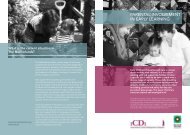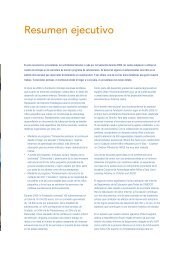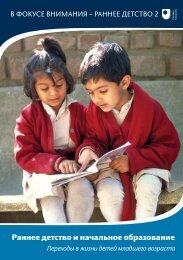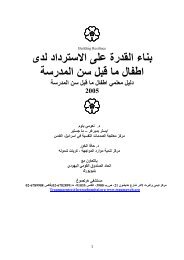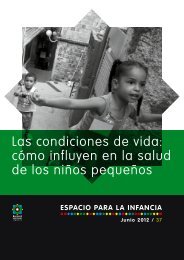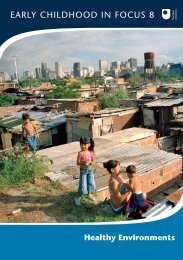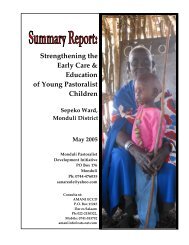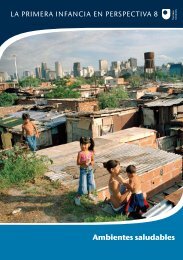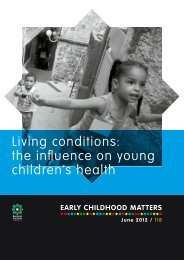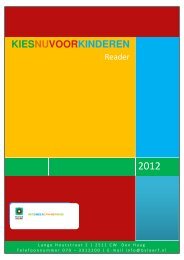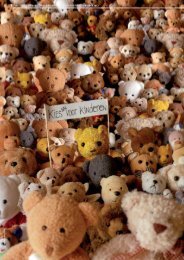Report - Bernard van Leer Foundation
Report - Bernard van Leer Foundation
Report - Bernard van Leer Foundation
You also want an ePaper? Increase the reach of your titles
YUMPU automatically turns print PDFs into web optimized ePapers that Google loves.
3.5 Programme content, approaches & resources, of pre-schools and early years of primary schools are limitedto primary school syllabus & teacher-directed approaches, which do not reflect community knowledge &beliefs about how children learn or what is important for them to learnCommunity Pre-schoolsPrimary SchoolsCHALLENGESCommunity Pre-school programmes content, approaches and resources are generally based on Primary Schoolsyllabus & teacher-directed approaches, BOTH of which do not reflect• community culture, language, knowledge or beliefs about how children learn or what is important for themto learn.‘There seems to be nothing in the school culture that indicates any thinking about the visions the pastoralist have fortheir children.. It looks like kids are just picked up out of their community culture and dropped into the school culture.’Research Team Member• participatory approaches or child-friendly methodology being advocated by the Monduli TTC & PrimaryEducation Development Plan 2002 – 2006• the use of existing local resources- ‘ A school inspector told me once that the syllabus is a guideline. As teachers we should read it, understand it, and then goand look for supporting information and resources to teach the children where you are working. I think I have been lazy, andI have not done that. When we look for additional resources at the District there is nothing, so it is easier just to teach froma book.’Teacher- ‘We don’t know Kiswahili stories, and we’re not even using Kimaasai stories.’ Maasai Teacher- ‘If the resources of the school are those from the community, the children and parents would feel and see more rele<strong>van</strong>ceand importance of formal education.’Maasai Teacher• programme flexibility & resources to meet the diverse needs & interests of the wide age ranges that areinvolved in programmes, e.g 2 – 8 / 8 years in Pre-schools, 7 – 10 years in Std 1.After two months of being in school Std 1 children shared their reflections thata) starting school was scarey & confusing – ‘I cried’ – girl age 8; ‘I ran away’ – boy age 9; “I was scared. I didn’tunderstand what the teacher was saying.’ – girl 7 yrs;c) there are ways that starting school can be made easier ‘…I liked coming to school with my older sister.’ – girl 6yrsInformal education in community contexts is declining, which is also weakening children’s foundation for successin formal education .‘If you have formal education but no culture, you are like half a person.’Male Community MemberFormal education should not be a replacement of the informal, but an extension of it‘The concept of going to school is important, but we have not realized that a child must continue to learn (knowledge,skills, values, attitudes etc) at home and in the community.’Village Executive OfficerTeachers assume that pastoralist young children starting school• have limited existing knowledge• are healthy and well nourished• are familiar with school culture & norms• are familiar with large groupings of children (classes) and school teaching approaches• are familiar with Kiswahili• have support structures at home for supporting formal education, e.g. light for doing homework; timenecessary and people to assist with homeworkThe Teacher Training Colleges is training pre-service students in participatory approaches , but there is ‘…little orno in-service training opportunities for teachers.’Head Teachers & TeachersOPPORTUNITIES …. Continued Over Page …33




